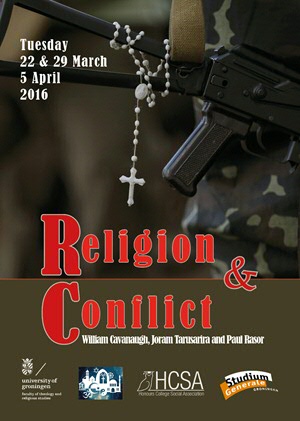Religie en Conflict: zijn geloof en geweld onlosmakelijk met elkaar verbonden?
De laatste tijd worden we regelmatig opgeschrikt door bloedige aanslagen. ‘Religieus geweld’ of ‘Islamitisch terrorisme’ roepen de koppen in de krant. Is religie en geweld zo onlosmakelijk met elkaar verbonden als we denken? In drie lezingen belichten wetenschappers waarom geloof en geweld steeds vaker in een adem genoemd worden. Deze serie start op dinsdag 22 maart 2016 in het Academiegebouw, Broerstraat 5 te Groningen en begint om 20.00 uur. De serie wordt georganiseerd door Studium Generale in samenwerking met the Centre for Religion, Conflict and the Public Domain van de Faculteit Godgeleerdheid en Godsdienstwetenschap van de RUG.
Meer informatie

Dinsdag 22 maart
Does Religion Cause Violence? – William Cavanaugh
In de Westerse, liberale samenleving, is het idee dat religie geweld voortbrengt een deel van onze algemene opinie geworden. Het beïnvloedt zowel ons nationale als internationale beleid en ontstaat door de scherpe scheiding die we maken tussen ‘religieus’ en ‘seculier’. William Cavanaugh, hoogleraar Theologie aan de DePaul University in Chicago, beargumenteert dat dit een Westers idee is, een mythe die men gebruikt om geweld tegen niet-Westerse groepen, met name Moslims, te rechtvaardigen.
Dinsdag 29 maart
Religion, Conflict and Peacebuilding: Through the Lens of Competitive Victimhood – Joram Tarusarira
In de conflictueuze relatie tussen gelovigen en ongelovigen nemen beide groepen vaak een slachtofferrol aan. Als seculieren met geweld reageren op vermoedelijk ‘religieuze’ aanslagen, claimen ze dat ze het slachtoffer zijn van religieus geweld en andersom. Joram Tarusarira , Assistant Professor in Religion, Conflict and Peacebuilding aan de RUG, analyseert het effect van deze competitieve slachtofferrol.
Dinsdag 5 april
University Colloquium: Hate Speech, Pluralism, and the Many Faces of Tolerance – Paul Rasor
Verdraagzaamheid is een van de belangrijkste, democratische waarden. Het is het fundament van vrijheid van religie en zorgt voor de sociale en politieke ruimte die nodig is in een democratie. Haat zaaien is een kenmerk van onverdraagzaamheid en in het huidige politieke klimaat bedreigt het de verdraagzaamheid in toenemende mate. Hoogleraar Rechtsgeleerdheid en theoloog Paul Rasor betwist onze opvattingen over verdraagzaamheid en democratische waarden. Voor het University Colloquium nodigt de Rijksuniversiteit Groningen aansprekende gastsprekers uit die hun sporen hebben verdiend in het bedrijfsleven of de Academie.
Meer nieuws
-
06 januari 2026
Geschiedenis dichterbij brengen
-
10 juni 2025
RUG en Rijksmuseum tekenen samenwerkingsovereenkomst
